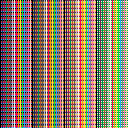Welp, this took way to long to finish. But now it's here!
about
picoforth is a programming language based on Forth, a family of stack-based programming languages. If you're unfamiliar with stack-based programming languages or Forth, I recommend you check out this site.
wordlist
Here is a list of every word in picoforth. (A "word" in a stack-based language is roughly equivalent to a "function" or a "subroutine" in a normal programming language.)
--typical forth stack-manipulating words pop 2pop dup 2dup over swap rotl rotr --mathematical operators + - * / // --integer division ^ --comparing operators = ~= > < --bitwise operators & --bitwise and, or, shr, shl, xor, and not, respectively | >> << ^^ ~ --storing and recalling ! --peek and poke, respectively @ --printing . --prints the popped item (works with strings and numbers) .stack --prints the entire stack (doesn't affect anything) --key operations chr ord key --halts the program until a key is pressed; pushes the pressed key input --repeats key until enter is pressed; pushes the finished string --branching branch --relative branch: I(nstruction)P(ointer) becomes the sum of itself and popped item goto --absolute branch: sets the IP to popped item --screen drawing cls flip spr pset --strings " -- opens a string, then closes it the next time it's used (i.e. " asdf " . will print asdf) "" --pushes an empty string join --concatenates the two top popped items sub # --length of string --miscellaneous exec --runs the popped item as if it were forth code time --pushes t()\1 rnd --pushes rnd(poppeditem\1) sin --pushes sin(poppeditem) cos --pushes cos(poppeditem) def --pushes the definition of popped item interpret --repeats input + exec forever --creating new words : -- : name-of-new-word [definition] ; ; |
Here's an example program, the one that generated the label image:
0 1 + dup dup 0x6000 + dup rotl ! 0x7fff < 2 * goto |
Post any spinoffs of this cart/programs in picoforth that you made in the comments. I'd love to see them!
For the previous picoforth, which was a work-in-progress, see this cart.

Wow, that is incredible! It's genuinely awesome to see people implement programming languages in this little FC. Forth especially, I've made a language inspired by it before. Here is the link to the entry on the Esolang wiki.
Download
Documentation


Came back a lot later, still great, one problem though: there isn't a for loop. I'll look into it further later, for now I have other stuff to do.

@Pico_Maker
There is no need for a for loop— that's what branch and goto are for. As an example:
0x5FFF 1 + dup 8 swap ! dup 0x603F ~= 2 * goto |
Which is roughly equivalent to the following pico-8 code:
a = 0x5FFF ::_:: a+=1 poke(a, 8) if(a ~= 0x603F)goto _ |
or more succinctly,
for i=0x5FFF,0x603F do poke(i,8) end |

@Einstein2
Ok, thanks!
Edit: So, is this right(?):
<from> <step> + <put code here> dup <to> ~= 2 * goto
Edit0: Yes, it is.
[Please log in to post a comment]








